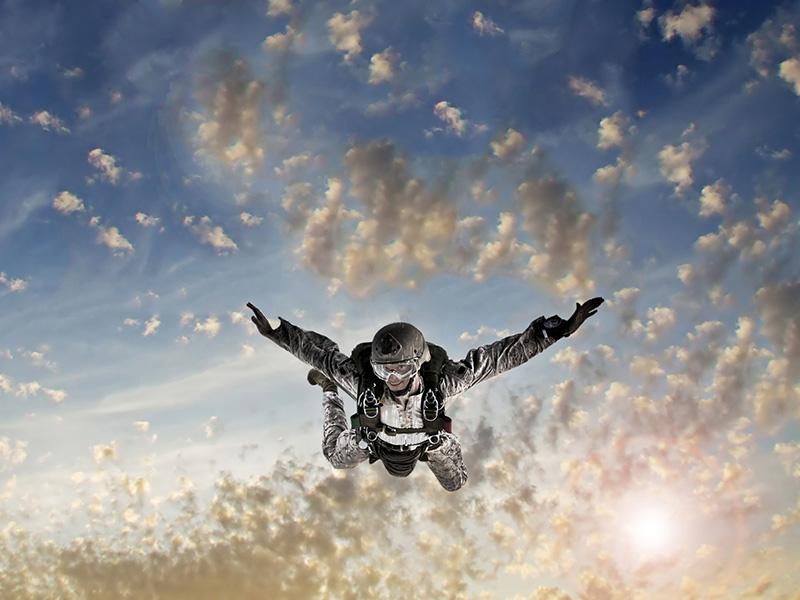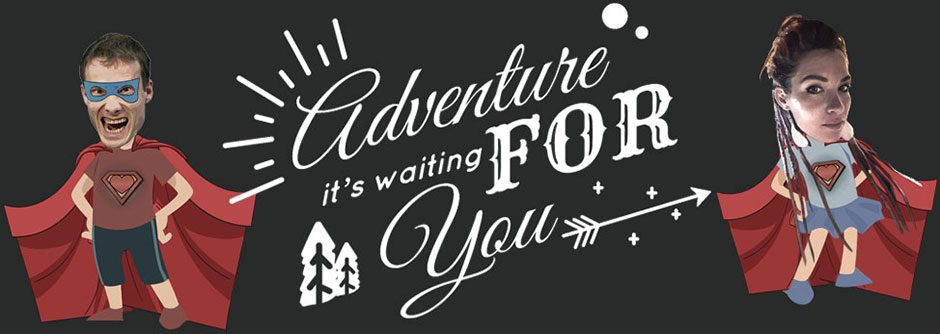Survival star vs. survival expert - How realistic are survival shows?
What is a Survival Star?
When Rüdiger Rehberg first went out into the wilderness many years ago to test his survival skills, the subject of survival was still largely unknown. Since then a lot has changed in this area, because today there is hardly anyone in our society who is not familiar with names like "Bear Grylls", "The Survival Duo", "The Crocodile Hunter" or "Sir Vival". D-Max has probably been the first to include series in its program that focus on a survival expert who has to overcome new deadly situations in each episode. The heroes of these series became real survival stars who found many fans and some of them even released their own product labels and merchandising products. But what actually makes a survival star? And what distinguishes him from a survival expert or a survival professional? How realistic are the TV and YouTube documentaries in this area? How helpful are the tips that are transmitted? We will now get to the bottom of these and other questions.
Is a survival star different from a survival expert?
When we watch series like Bear Gryll's "Man vs. Wild", we get to see a documentary in which a human being survives in an inhospitable wilderness despite all adversities. Usually, he has the situation completely under control and explains to his viewers how his tricks work. In this respect, he appears at first glance as a survival expert who knows his way around the field of survival wiki and can therefore cope with any situation. This can actually be the case. But it does not have to be. After all, we must not forget that this is a television show. And as with everything that can be seen in the media, a lot of tricks are used to create a virtual reality that does not exist in reality. This means that a survival star can be a survival expert who presents his skills on television. But it can also just be an actor who plays a role and performs actions that are in the script. And he himself does not need to know the slightest thing about surviving extreme situations. Usually, however, it is a mixture of both. Because most survival stars are actually people who can draw on a wealth of experience in survival. But even this is no guarantee that what they show in front of the camera is really a realistic and meaningful action in an emergency. After all, the needs of a TV show can be very different from what is needed in a real situation. Moreover, it always depends on the motivation of the survival expert to become a survival star. Some want to become famous and successful in this way and earn their living directly with their survival shows. Others want to draw attention to their training and courses with their television appearances, and in this way win new customers. Still others want to use the medium "video" or "television" as a platform to share knowledge and help other survival fans to develop. In the latter case, their film contributions are mainly tutorials in which they explain various skills and abilities as precisely as possible. Such videos can be found on streaming exchanges like YouTube and rarely on television. Because here it always depends primarily on the viewer ratings. This means that a survival star appearing on TV is actually fighting less for his own survival in the wilderness than for the survival of his show on TV. This is another form of survival, just a completely different one.What distinguishes a survival star from a survival expert?
So let's take a famous survival star who appears on television and compare him with a survival expert who lives his adventures for himself. In this case we have two completely different starting situations. The survival expert usually goes into a dangerous situation voluntarily and alone, which he then wants to master. Rüdiger Nehberg, for example, let himself be exposed in the jungle with nothing but a camera, a knife and his swimming trunks for a survival experiment, only to find his way back to civilization. I myself have had many similar experiences, during which I have repeatedly gone into new, unknown situations, either alone or with one or two friends or seminar participants. Be it in the bird rock on Iceland or in the Polish wilderness at -22°C in winter. A survival star, on the other hand, may find himself in the same situations, but always has a camera team with him. Even if it looks on TV afterwards as if he was alone, there are always people around him. On the one hand this eliminates the problem of loneliness already described and on the other hand it also creates a completely new risk relationship.
For example, if I go on a tour through the Thai jungle and accidentally get bad water, it can happen that I get completely dehydrated due to the strong diarrhoea and vomiting afterwards. This costs a lot of energy and also leads to a loss of attention. So there is a good chance that I will now be the victim of an accident or an unhealthy collision with a poisonous snake. Or that I can no longer orientate myself and simply die of thirst after a while. I am aware of all this, which is why I will be very careful if I intend to quench my thirst at an unknown water source. As a survival star with a camera team and usually also has his own security team with paramedics and doctors, the situation is of course completely different. I'm not now in danger of my life because I get a little diarrhoea, but have (even if this may sound absurd at first) even the chance to get some really nasty, disgusting footage. Nothing fascinates people in front of the TV more than watching other people suffer, especially when they recover at the end and everything still somehow works out. Remember: The survival star isn't really fighting for his survival. In case of doubt he can be taken by helicopter to the nearest hospital within a few hours and can be fully treated there according to the latest standards. But he's always fighting for ratings and anything that makes his adventure seem even harder, more blatant, dangerous and unsolvable is a positive thing.
So here we come straight to the first important point that should be clear to every Survival fan when they watch a Survival show on TV: The behavior that a survival star displays CAN be appropriate and helpful to the situation, but it does not have to be. In fact, it may be the exact opposite of what you would normally do in a real situation.
Another example: A survival expert in a real situation always tries to avoid any risk and save as much energy as possible. He knows that he has very little food available and that no help will come if he twists his foot or breaks his leg. So if he has the choice to follow an animal trail or to fight his way through the bush with a machete, he will take the animal trail. If there is a chance to overcome a rock by climbing up a slope, he will do so and not risk falling to his death in a daring free-climbing action. A survival star, on the other hand, must always act in a way that is most exciting for the spectators. If you turn on an episode of "Exposed in the Wilderness - The Struggle for Naked Survival" and then only see a man walking leisurely on easy paths through a forest to build a fire somewhere and warm his feet, then this was certainly the last episode of this show we ever watched. In the film it must not be easy, because then we find it boring. Here we need action! So if there is a chance to overcome a rock, to climb up a trail, or to climb up slippery rocks in a waterfall, then the survival star will choose the waterfall. Unlike the expert, who has to survive alone in the wilderness, the TV star usually does not take any risks. Because what you won't see on TV later is that he has a safety team at his disposal, which first installs a top rope on the rock, so that the survival hero is secured the whole time. Later in the film studio the rope and the carabiners are then retouched out again.
How realistic are the scenarios on Survival TV?
This question can be answered similarly to the question: "How realistic are the relationships in a love movie? It is quite clear that Survival TV...
Follows a script that was written by people and therefore doesn't necessarily have to stick to reality. Nonetheless, there are of course screenwriters who are very much oriented towards real life and who try to portray scenes as they could happen in reality. Others, on the other hand, mainly aim at the action content, tension and entertainment value without paying much attention to reality. this is especially the case with survival scenes in feature films. If you follow the survival techniques of Rambo, Castaway or The Revenant, you will most likely die within minutes. But also the survival scenarios in reality series like "Bear Grylls" or the "Survival Duo" are sometimes quite far away from reality. Bear Grylls, for example, has a talent for always finding exactly the things he needs by chance, even if they would almost never happen in reality.
Another stylistic device that is very popular on television in connection with survival scenes is a so-called crossover. This means that several situations are lumped together and mixed together. The individual scenes on their own would be quite realistic, but all together are pure fantasy.
Equally, people like to ignore essential areas on TV, because they are either too difficult or too long-winded to be portrayed, because they don't seem to be interesting, because the script writers don't even know that they are important or because they don't play an essential role in the story. A good example for this is the series "Lost", in which a group of wildly mixed-up people gets into a survival situation after they crash with a plane on a deserted island. In addition to a series of mystical and imaginative events, many survival scenarios are depicted and themed. For the sake of simplicity, however, essential questions such as the supply of food for such a large group on an unknown island are only marginally addressed, without really going into it. For example, the completely inexperienced crash victims catch a wild boar, which would never be possible in this way in reality. Popular topics to leave them out of consideration in TV shows are generally the procurement of water, dealing with mosquitoes and other pests, orientation in unknown terrain and dealing with fears, loneliness and psychological thresholds. On the other hand, topics such as wound care and hygiene are often over-themed to give the impression that we humans cannot survive without our modern medicine. The fact that we have survived many thousands of years in this way is better left out of account.
The behaviour of animals is also often abstracted or over-dramatised in the film to create a tension. Even today, the cliché of the "bad wolf" or the wild beasts that attack people for no reason and thus bring them into dangerous situations that normally do not exist in this form is often upheld. At least not if you have a minimum of tact and attention, so that you do not consciously threaten the animals or put them in a position to defend themselves.
However, the topic that is most faked is probably fire making. Here, on television, we love to leave out all the steps of preparing and large-scale breeding of a first embers towards a flame. Usually you see two steps and then a spark or a slight frictional heat immediately turns into a blazing flash.
So it's all fake on TV?
No! Even the survival star must possess many skills to credibly convey that he can cope with his extreme situation. But they look completely different from those of the survival expert. The latter, for example, must have the necessary plant knowledge to distinguish edible plants from poisonous ones. He needs knowledge in tracing to be able to set traps correctly. He also needs to know how to gut animals, how to build a shelter and much more. The TV star does not necessarily need all this knowledge. Because he has a research team with him, who has this knowledge for him and gives him the appropriate instructions shortly before shooting. Instead, however, the TV survival star is required to push himself physically to his limits again and again. For example, we were once experts on a film shoot for an episode that was about survival in a swamp. To do this, the survival star had to consciously put himself in danger of sinking into the swamp and then demonstrate how to get free again. Of course, he was secured the whole time by a rope, which was held by two muscle-bound firemen. But when things finally got a bit too dicey and there was a brief thought of breaking off the situation and pulling out the TV hero, it was discovered that the rope was completely useless. The suction force of the bog was so strong that the firemen had no chance to make a difference. The fact was that they had not tested whether the safety measure really worked before starting shooting. So if the man had not been physically fit and mentally unstable, there could have been a serious danger to his life. However, by keeping control of himself at all times, not panicking and acting in a considered manner, he was able to free himself from his situation in the end. Mn must say that the bog was only about four degrees Celsius cold. Also the temperature of the star was constantly monitored to make sure that he didn't fall into life-threatening hypothermia. But it was still required that he went to the extreme to make the scene realistic. After he had freed himself, the rest of the show still had to be shot. This meant that he was forced to shoot a complete summary of the events and an intro for the follow-up show before he was allowed to take a hot shower. A survival expert in a real-life situation would never have taken on such exertions. He would have made a fire immediately after he got free and would have dried and warmed himself to regain his strength.

Dr Sir Vival Heiko Gärtner Portrait
So you definitely can't believe everything you see on TV and a lot of what a survival star shows doesn't really belong in his skills report. But he's still usually a fucking tough bastard and does things that many others would fail at just thinking about it. And in fact, the job of a television survivor is not without danger. Because there is another big difference to the survival expert that should not be underestimated. The survival expert is always responsible for himself and it was part of his training to learn to assess every situation and also himself. So he will never do something he feels he is not up to or where he feels the risk is too high. With a survival star on the other hand, it is the broadcaster or production company that determines what will be shown on television in the end. This does not always have to correspond to the skills of the actor. Especially in extreme situations, accidents occur again and again, which can sometimes end fatally. A good example for this is the Crocodile Hunter, who was killed by a stingray out of carelessness. Without the pressure of being a TV star, this would probably not have happened to him, because he would always have checked if he was feeling completely on top of things or not. Do I have the attention and concentration I need to safely master this task? Yes or No? If not, I wait until I feel safe again. For a camera team, however, every day of shooting is hard cash. So you can't just sit out a week and do nothing because an actor isn't feeling well right now. Show must go on! is the motto and so it happens all too often that the stars go beyond their limits and risk their lives. Usually it works out well anyway, because they are real professionals in their field, but not always.
Can I learn something from survival shows?
It is important to always be aware that the information that can be gained from a survival show must first be passed through a mental television filter. So always ask yourself the following questions: Is this the easiest, least risky and most energy-saving way to master the situation? Is the hero taking an unnecessary risk here? Would I find the situation in reality in the same way or are "coincidences" deliberately initialized here, which are effective for television? Do I need prior knowledge for the techniques shown, or knowledge that I do not have? Are steps omitted that are not effective but are needed for it to really work?
If you ask yourself these questions and answer them seriously, you can already filter out a lot of mischief from the TV and YouTube shows about Survival. All that remains are tricks and techniques that you can try out to see if they really work. However, it is advisable to test them first as Bushcraft skills. This means that you should try them while you are in a safe environment and not in a serious danger situation. If they work, you can get inspired for the case of emergency.
This is also what you can generally take away from survival shows and from survival stars: The inspiration and the enthusiasm for adventure. Let yourself be captivated by the many possibilities to explore nature and to face new challenges again and again. Look for mentors and survival trainers from whom you can learn new skills and then set off to go out into the real world of adventure!
You can read here which education and training courses are the right ones for you. We have also prepared some information for you about what makes a survival expert and what you should be able to do to become a real survival professional. If there are any questions left unanswered, feel free to send us a message or comment at any time! we are here for you!















